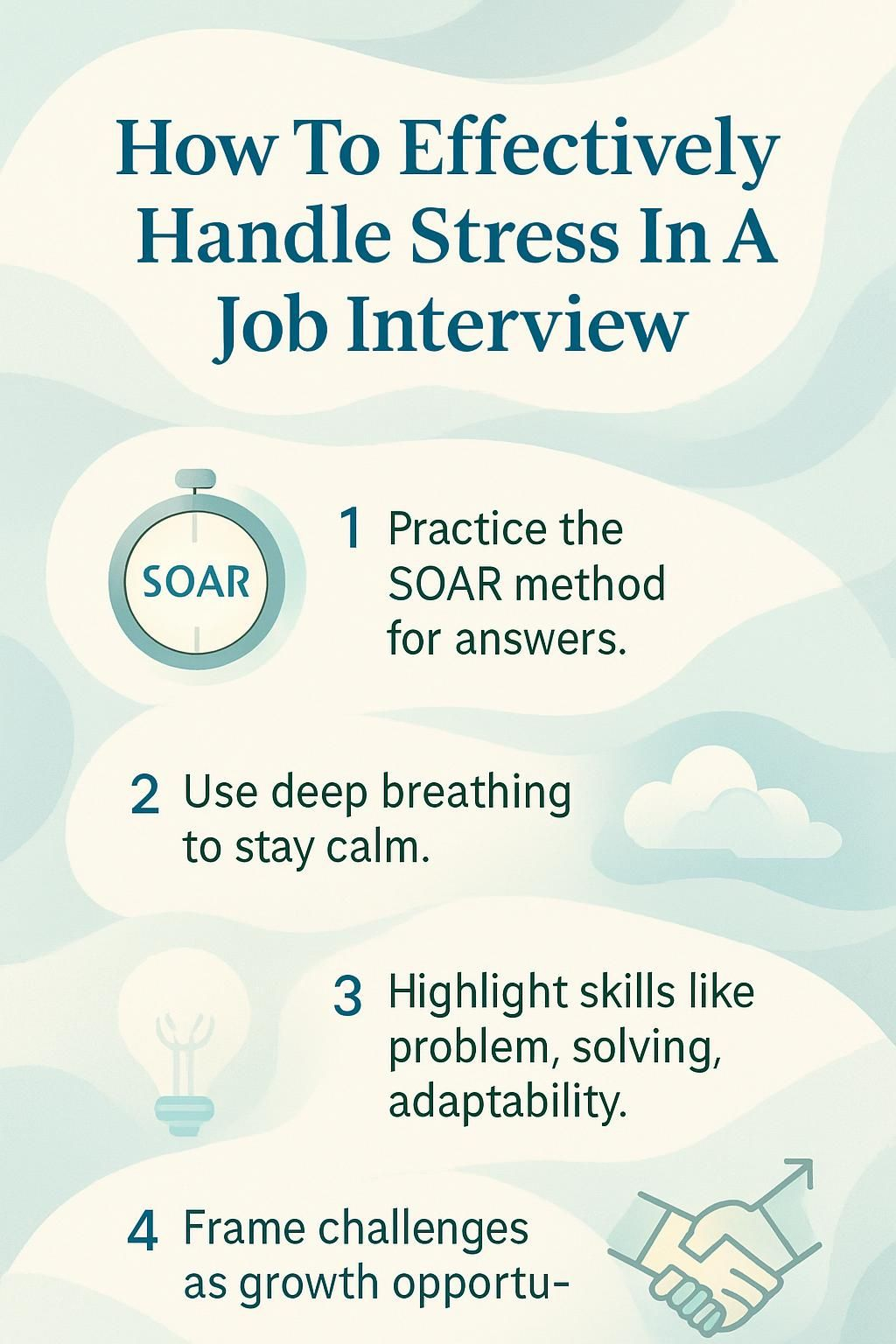Learn to answer How Do You Handle Stress? in a job interview with this guide, providing sample responses, practical tips, and strategies to demonstrate resilience and composure to employers.
Get Started.png)

Job interviews can make anyone feel stressed. Many people struggle with the question, "How do you handle stress?" during a job interview. This post will help you stay calm and answer stress-related questions confidently.
Read on to learn simple ways to ace your next interview.


Job interviews create stress because they test skills, knowledge, and confidence under pressure. The fear of judgment, uncertainty about questions, and high stakes make even experienced professionals nervous.
Employers evaluate how candidates handle workplace stress, so the interview itself becomes a performance challenge.
Pressure can turn coal into diamonds—it’s all about how you handle it.
Stress often comes from tight deadlines or tough questions that mimic real job challenges. Many worry about giving weak answers or appearing unprepared. Nervousness is normal but can be managed with practice and relaxation techniques like deep breathing.
Interviewers look for problem-solving skills and emotional intelligence in stressful situations to see if candidates fit high-pressure roles.
Employers assess stress management by observing how candidates react under pressure. They look for traits like problem-solving, adaptability, and clear communication during challenging interview questions.
Stress resilience helps employees stay productive under pressure. Many jobs involve tight deadlines, unexpected challenges, and high-pressure situations. Workers who handle stress well adapt quickly and solve problems efficiently.
Employers value candidates with strong coping mechanisms. Skills like time management, conflict resolution, and open communication matter in stressful environments. Showing how you turn stress into motivation proves your ability to thrive.
Stories about overcoming work-related stress highlight problem-solving skills and growth mindset for potential employers.
Interviewers seek candidates who show strong stress resilience and problem-solving skills. They value effective communication, time management, and the ability to stay calm under pressure.
Soft skills like teamwork and adaptability also matter, as they help handle workplace stress.
A good response highlights how stress motivates action rather than causing panic. Employers want examples of handling tight deadlines or conflicts with a positive mindset. Demonstrating growth from past challenges strengthens your answer.
Next, let’s explore how to prepare for stressful interview questions.
Pressure can turn coal into diamonds—it's all about how you handle it.
Research common stress-related questions to anticipate what may come up. Practice answers using the SOAR method to stay clear and confident.
Prepare real-life examples that show how you handle pressure well. Keep responses short, focused, and relevant to the job.
Job interviews often include stress-related questions to test your coping skills. Employers ask about tight deadlines, workplace conflicts, or unexpected challenges to see how you handle pressure.
Prepare by reviewing common questions like “How do you manage stress?” or “Describe a high-pressure situation.” Use the SOAR method (Situation, Objective, Action, Result) to structure clear answers with real examples.
Practice responses that highlight problem-solving and time-management skills. Show how stress motivated you instead of holding you back. For instance, explain how meeting a tough deadline improved your efficiency.
Tailor answers to the job’s demands, focusing on soft skills like communication and adaptability. Rehearse with a colleague to build confidence in delivering concise, strong responses under pressure.
Handling stress in a job interview becomes easier with structured responses. The SOAR method helps frame answers clearly and confidently.
Use this method to practice common stress-related questions. Tailor your examples to match the job role for better impact. This structure keeps answers concise while showcasing resilience and growth. Keep responses under two minutes for clarity. Avoid vague statements, and always link stress to motivation and learning.
Once you practice responses using the SOAR method, focus on making your answers clear and brief. Employers look for candidates who communicate effectively under pressure. Keep responses short by sticking to key points that highlight problem-solving skills and stress resilience without rambling.
Use real examples from past work experiences to show confidence. Structure each answer with a clear situation, action, and result. This helps interviewers see how you manage tight deadlines or workplace stress while staying composed.
Tailor every response to the job role to prove your fit for high-pressure situations._.
Stay calm by using deep breathing, keep a positive attitude, listen carefully to questions, and practice answers beforehand—these simple steps can help you ace your interview.
(Entities: Deep breathing techniques Tool, Positive mindset Concept, Active listening Concept)
Deep breathing helps control stress during interviews. Slow, steady breaths lower tension and keep your mind clear. Try inhaling for four seconds, holding it briefly, then exhaling for six seconds.
This technique calms nerves quickly so you stay focused on answering questions well.
Practice deep breathing before the interview to make it feel natural. Use short pauses between answers to take a quiet breath if needed. Showing calm under pressure proves strong stress management skills, a trait employers value in high-pressure roles like tight deadlines or team conflicts.
Breathing exercises also improve mental clarity and confidence when discussing past challenges confidently with the SOAR method (Situation-Objective-Action-Result).
Keeping a positive mindset helps you stay calm and focused during a job interview. Stress can feel overwhelming, but viewing it as motivation rather than fear improves performance.
Employers value candidates who show resilience under pressure.
Use past experiences to prove how stress pushed you to succeed. For example, tight deadlines or workplace conflicts can highlight problem-solving skills. Practice relaxation techniques like deep breathing to stay composed.
A confident attitude makes your answers clearer and more convincing. Align your response with the job’s demands by using relevant examples of handling work-related stress effectively.
Active listening helps you stay engaged and reduces stress during a job interview. Pay close attention to the interviewer’s questions instead of planning your next response. This shows strong communication skills and keeps the conversation natural.
Nodding, maintaining eye contact, and repeating key points back ensures clarity. It also helps tailor your answers to what the employer values most. Practicing this skill beforehand with a friend builds confidence for high-pressure situations.
When answering stress-related questions, give real examples of how you stayed calm under pressure. Show how you solved problems and used skills like time management or teamwork to succeed.
Focus on positive outcomes—explain how stress pushed you to improve your work or meet tight deadlines effectively. Keep your answer clear and relevant to the job.
Show how you handled stress with real-life examples. Talk about a time you met tight deadlines or resolved workplace conflicts. Describe the situation, your actions, and the positive result.
For instance, explain how stress pushed you to improve time management or find creative solutions.
Keep your answer relevant to the job. If applying for a marketing role, share how data-driven decisions helped manage campaign pressure. Use the SOAR method (Situation, Objective, Action, Result) to structure responses clearly.
Highlight soft skills like problem-solving and communication that turned stress into motivation for success.
Problem-solving skills matter in job interviews. Employers want to see how you handle stress and find solutions. Use real examples where you faced tight deadlines or workplace conflicts.
Explain the steps you took, like breaking tasks into smaller parts or seeking support from mentors. This shows your ability to stay calm under pressure while delivering results.
Focus on outcomes when describing stressful situations. For example, mention how a project deadline pushed you to improve time management or teamwork. Avoid vague answers by using the SOAR method (Situation, Objective, Action, Result).
Highlight soft skills like communication and adaptability to prove stress motivates rather than hinders you. Keep responses concise and relevant to the job’s demands for better impact.
Stress can push people beyond their limits if managed well; many find high-pressure situations fuel better performance rather than hinder them.Employers appreciate candidates who turn work-related stressors like tight deadlines into motivation.For example,a demanding project might have forced faster decision-making,prompting creative solutions under pressure.Share specific instances where meeting challenges head-on led measurable results.Stress becomes valuable when framed positively,demonstrating adaptability,growth,and strong mental health habits.Tailor responses around roles requiring resilience—like leadership positions—to show alignment between personal coping strategies,job demands,and long-term success.Practice framing past struggles using STAR method(Situation Task Action Result)for clarity without dwelling negativity.Soft skills like time management shine here too since they prove proactive control over difficult circumstances
Different jobs require different stress management skills. A project manager might focus on meeting tight deadlines, while a customer service rep could highlight handling difficult clients.
Match your answer to the job description by using relevant examples of workplace stress from past roles.
Show how your coping methods fit the role’s demands. For example, mention time management for fast-paced jobs or team-building for collaborative roles. Use keywords like problem-solving and communication skills to align with what employers want.
Keep responses concise and tie them directly to the job’s challenges.
Never say you never feel stressed—instead show how you manage pressure well using real examples like meeting tight deadlines at work.
Read more tips below!
Admitting you feel stress in a job interview shows self-awareness. Employers expect honesty about handling workplace pressure, not perfection. Denying stress can make you seem unrealistic or unaware of challenges.
Use examples where stress pushed you to improve time management or problem-solving skills. Explain how tight deadlines or high-pressure situations helped you grow. Showcase soft skills like communication and adaptability instead of pretending stress doesn’t affect you.
Next, focus on framing stressful experiences positively for stronger answers.
Talking about negative emotions like frustration or fear can make employers doubt your ability under pressure during interviews (keyword). Instead shift attention toward actions taken (keyword) rather than feelings felt (keyword).
For example explain how tight deadlines pushed productivity without dwelling complaints; show results achieved despite challenges faced using STAR Method structure effectively here too if applicable!
Highlight healthy coping mechanisms such time management breaks exercise open communication colleagues supervisors prove resilience adaptability high-pressure scenarios better impression leaves interviewer seeing strengths weaknesses avoided altogether mentioned briefly turned learning moments growth opportunities instead!
Blaming coworkers or managers during an interview makes you seem unprofessional under pressure instead show accountability employers want problem solvers who take ownership share stories where conflict happened but explain actions taken without pointing fingers
For example if asked about tight deadlines discuss teamwork adjustments made rather than criticizing delays frame challenges positively like adapting workflows improving time management proving resilience matters more than assigning fault
Give clear, real-life examples to show how you handle stress. Use the STAR method (Situation, Task, Action, Result) to structure your answers effectively.
For tight deadlines, explain how you prioritized tasks and stayed organized. For conflicts or unexpected challenges, describe problem-solving steps and positive outcomes.
Facing tight deadlines is a common stressor in many jobs. Employers want to see how you stay calm and deliver results under pressure. Share a specific example where you managed a time-sensitive project successfully.
Use the SOAR method: describe the Situation, your Objective, the Actions you took, and the Result. For instance, explain how breaking tasks into smaller steps helped meet the deadline while maintaining quality.
Highlight skills like time management and problem-solving in your response. Show how stress pushed you to prioritize effectively or collaborate with teammates for faster solutions.
Avoid blaming others or focusing on negative emotions; instead, emphasize growth and lessons learned from handling high-pressure situations. This approach keeps your answer positive and relevant to the job’s demands.
Next, let’s explore managing workplace conflicts as another key stress scenario.
Handling workplace conflict shows employers your ability under pressure. Describe resolving disagreements professionally using open communication. For example, explain mediating between team members over project priorities.
Outline steps like listening actively, finding common ground, then proposing solutions. Keep responses structured around Situation, Task, Action, Result (SOAR)..
Stress here becomes motivation if framed right. Share how clashes led better collaboration later. Mention soft skills like patience , negotiation , keeping calm . Tie lessons back directly toward role demands like teamwork , leadership , meeting deadlines without burning out .
Unexpected challenges test your ability to think fast and stay composed under pressure. A strong response could describe a time when last-minute changes disrupted a project deadline.
Explain how you prioritized tasks, used problem-solving skills, and communicated clearly with the team to adjust quickly.
Highlighting soft skills like adaptability and time management shows interviewers you can thrive in high-pressure situations. For instance, if technical issues delayed a client presentation, share how you found a backup solution while staying calm.
Stress motivated you to act decisively, turning obstacles into opportunities for growth. Keep answers relevant to the job by linking examples directly to workplace stress scenarios it may involve.
Arrive early to settle your nerves and review key points. Use positive body language like steady eye contact to project confidence.
Take slow breaths if you feel tense and keep water nearby to stay focused. Practice grounding techniques like counting objects in the room to redirect stress.
Getting to the interview location early gives you time to settle in and ease nerves. Use those extra minutes to review your notes, practice deep breathing exercises, or visualize success.
A calm mind improves focus and helps you tackle stress-related questions with confidence.
Familiarize yourself with the space to reduce interview anxiety. Walk around if possible, sit quietly, or adjust your posture for better non-verbal communication. Hydrate and take slow breaths before starting.
This simple routine builds a positive mindset for high-pressure situations. Preparing mentally ensures smoother responses to workplace stress questions later on.
Next, let’s explore how body language influences interview confidence.
After arriving early gives you time relax before meeting employers pay attention body language too strong nonverbal cues boost credibility Keep eye contact firm handshake upright posture show self-assurance Smile naturally lean slightly forward signal engagement These small actions reinforce verbal answers
Avoid fidgeting crossing arms slouching which suggest nerves Instead practice open gestures controlled movements mirror interviewer energy This builds rapport without saying much Nonverbal signals like nodding steady voice tone prove composure under pressure They complement soft skills like active listening problem-solving mentioned earlier
Drinking water keeps your mind sharp and reduces tension. Dehydration can make you feel anxious or sluggish. Bring a water bottle to the interview and sip slowly to stay focused.
Deep breathing calms nerves and improves clarity. Before answering tough questions, take a slow breath in and out. This simple relaxation technique helps you stay composed in high-pressure situations.
Practice beforehand to make it a habit during the interview.
Reflect on your performance, send a thank-you email, and focus on lessons learned to improve future interviews—read more for stress-free interview success.
After the interview, take time to review how you handled stress. Identify what went well and where you can improve. Focus on your communication skills, body language, and responses to tough questions.
Use past experiences as lessons for future interviews. Note if stress motivated better performance or caused setbacks. Keep a list of key takeaways to refine your approach next time.
This builds resilience and sharpens your problem-solving abilities under pressure.
Sending a thank-you note after the interview reinforces your professionalism and keeps you fresh in the interviewer’s mind. A brief email works well, mentioning something specific from the conversation to show active listening and continued interest in the role.
Keep it concise but personalized. Highlight how your skills match the job, like stress management or problem-solving abilities, tying back to points discussed earlier. Sending it within 24 hours strengthens your candidacy while showing good communication skills.
If relevant, briefly restate enthusiasm for contributing effectively under pressure if stress-related topics came up during the interview.
After the interview, review what worked well and where you faced challenges. Identify patterns in your responses to stress-related questions like tight deadlines or workplace conflicts.
Write down key points from your examples using the STAR method for clearer storytelling next time.
Use self-reflection to improve soft skills such as communication and problem-solving. Practice relaxation techniques before future interviews to stay calm. Apply feedback from mock interviews with a colleague to refine your answers about handling high-pressure situations effectively.
Keep adapting strategies based on real experiences for better results next time.
Job interviews can be stressful, but you can handle them effectively. Prepare with practice, deep breathing, and strong answers about past experiences. Show how stress motivated you to solve problems and meet deadlines.
Stay confident through body language and active listening. Handling stress well demonstrates you’re ready for the job—keep improving and maintain a positive mindset for future success.
Prepare in advance by practicing common questions using the STAR method. Use relaxation techniques like deep breathing exercises to stay calm. Good time management and a positive mindset help reduce workplace stress.
Focus on self-care, such as getting enough rest and eating well. Break tasks into to-do lists to avoid feeling overwhelmed. Open communication with a mentor or friend can provide support.
Keep your answers clear and structured. Use communication skills to express yourself confidently. View stress as a motivator rather than a barrier.
Yes, too much stress may weaken your soft skills, like active listening. Practice stress management strategies beforehand to stay focused and professional.
Pause and take a slow breath to regain composure. Focus on the question and answer step by step. Remember, interviewers understand stressful situations and value resilience.